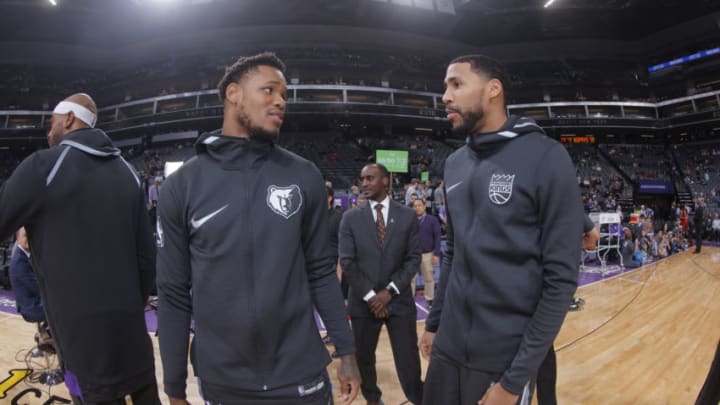NBA Trade Grades: Kings, Grizzlies swapping Garrett Temple for Ben McLemore

Sacramento Kings
Oh, KANGZ. You just can’t help yourselves, can you? While this trade is nowhere near being disastrous, adding to the team’s glut of shooting guards and centers is borderline hilarious at this point.
— Greg (@gwiss) July 17, 2018
A simple look at the Kings’ roster shows the team’s depth at the 2, so even if McLemore’s entire Sacramento tenure hadn’t been throughly disappointing, trading for any shooting guard who wasn’t an established star would’ve been a head-scratcher.
It’s part of the reason why the massive Zach LaVine offer sheet was so mind-boggling, and it’s why bringing a 25-year-old McLemore back to the city that stunted his growth is a demoralizing decision for the team, the fanbase and the player himself.
McLemore and Rich Paul after learning he's going back to the Kings pic.twitter.com/w7qmxOCmMN
— Justin Rowan (@Cavsanada) July 17, 2018
On the wing, Sacramento already has Buddy Hield, who was once heralded as having “Stephen Curry potential” by the organization. Hield has come nowhere near validating those claims, but he still had a solid second season in the league, averaging 13.5 points per game on 43.1 percent shooting from 3-point range.
The Kings also have Bogdan Bogdanovic at the 2, and the 25-year-old rookie did not disappoint, flashing an NBA-ready game en route to 11.8 points and 3.3 assists per game on .446/.392/.840 shooting splits while starting in 52 of his 78 games.
So as much as Temple was an expiring contract who didn’t have a place in Sacramento beyond the upcoming season, McLemore — who averaged an underwhelming 7.5 points per game on 34.6 percent shooting from deep last year — makes little sense on this roster.
/sees trade
— Hardwood Paroxysm (@HPbasketball) July 17, 2018
“Wait, why would the Kings…?”
“Oh, that’s right. Kangz.”
Temple is the better player, and bringing back a guy who struggled to ever find his footing both in Sacramento and in Memphis makes no sense. This pairing didn’t work when McLemore was losing out on minutes to freaking James Anderson, and there’s even less reason to think it’ll suddenly work out now.
But surely then, perhaps Deyonta Davis can bring something to the table? He finished the season on a strong note and is still only 21 years old, after all.
While Davis would be a worthwhile gamble for another team, in Sacramento, it once again makes little sense. The Kings already have Willie Cauley-Stein, Harry Giles and Kosta Koufos at center, with Marvin Bagley III, Skal Labissiere and Zach Randolph at the 4. It’s hard to make a case for Davis earning minutes over any of those guys.
The Kings just took the Grizzlies' worst players and sent back a kinda decent player/expiring contract. So good to have Sacramento in the NBA.
— John Martin (@JohnMartin929) July 17, 2018
Snagging a 2021 second-rounder and cash is fine, and losing Temple isn’t some franchise-altering blow, but having such a well-liked and respected veteran in the locker room is important for such a young team.
Given that Temple is the best player in the deal and the Kings brought in two uncomfortable fits who are unlikely to earn minutes, this deal really depends on what they do with the minimal extra cap space they just freed up.
Here is the updated cap breakdown for Sacramento: The Kings now have a league high $20.5M in room after acquiring Ben McLemore and Deyonta Davis. McLemore is in the last year of his contract with a $5.4M cap hit. Davis has a $1.5M cap hit and is also in... https://t.co/QgZ8JPHLXW
— Bobby Marks (@BobbyMarks42) July 17, 2018
Is Sacramento going to make another play on a restricted free agent like Clint Capela? That would represent an upgrade over both WCS and Giles at the 5, but the Houston Rockets would be likely to match an offer, even as they continue to lowball their starting center in a tight market.
The Kings could also turn to the trade market, where they could use the cap space to more easily maneuver for a star like Kawhi Leonard or a salary dump like Ryan Anderson:
Until a massive-upside play like that materializes, however, this is not a good deal for the Kings, and netting that extra $1 million in cap space hardly seems like it’s going to make the ultimate difference.
Next: 2018 NBA free agency tracker: Grades for every deal so far
Grade: C-